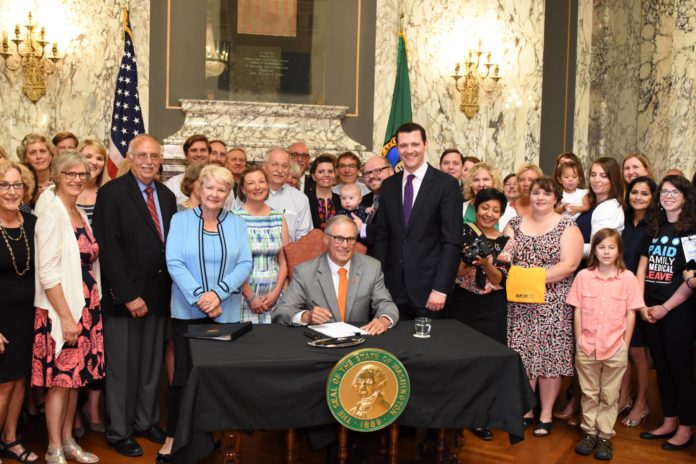
Washington’s new paid family leave program could be more than just a boon for Washington families, the bipartisan effort may also be a model for other states.
That’s what Sen. Karen Keiser, D-Kent, one of the bill’s lead authors, and Bob Battles, general counsel for the Association of Washington Business, said of the effort, which brought together a surprisingly diverse group of Republicans, Democrats, business officials and labor representatives.
“Other states have built paid family leave systems off of legacy programs like disability insurance, but this is the first one started from scratch,” Keiser said. “So far, only four other states have something like this. All the other states that are looking at doing this can look at Washington now on how to build their own systems from scratch.”
The four other states with programs are California, New Jersey, Rhode Island and New York. Keiser said she thinks the program could help states like Oregon, Colorado and Minnesota, which are currently looking at paid family leave measures but also have no system in place to build from.
The paid family leave program, approved by the Washington Legislature on June 30, passed the Senate on a 31-12 vote and the House on a 65-29 vote. Gov. Jay Inslee signed the bill earlier this week.
It completes an older effort, launched in 2007, that failed because the funding mechanism needed work, Keiser said.
“That one got put on the shelf, which was very disappointing, but with partners in the business community, this time we were able to move things forward,” she explained.
In the program, eligible employees get 12 weeks of family or medical leave, with a cap of 16 weeks per year if an employee experiences both a family and medical crisis. Women with pregnancy complications can get an additional two weeks leave.
“The fact is most women return to work within two weeks of giving birth,” Keiser said. “That’s not enough time for bonding, and it’s not enough time for recovery. We felt we had to address that.”
Both employees and employers pay for the program through a payroll tax, and businesses with fewer than 50 employees are exempt from premiums. Employees are eligible for the program after working 820 hours.
“The Association of Washington Business fully supports the legislation that was passed,” said Battles, who is also government affairs director for employment law with the group. “We were part of the negotiation team. We believe this is a good compromise that limits costs to business and serves employees.”
Employees will be eligible to take leave starting in 2020, with premiums starting in 2019.
Sen. Joe Fain, R-Auburn, the lead Republican author, said he thinks the bill will do well to meet the needs of Washington families.
“Major life events like the birth of a child or adoption aren’t something you can prepare for or recover from in a day,” Fain said in a release. “Too often moms and dads are not able to take time to bond and care for their newborn, or recover from serious injury. Our paid family and medical leave plan provides economic stability for working families, while respecting the needs of employers.”
Keiser said most employees would pay less than $2 a week for the coverage. Low wage employees making up to $17 an hour would get about 90 percent of their income in the weekly benefit, with an overall cap of $1,000 a week for others.
Workers pay about 63 percent of the cost of the program, while employers pay 37 percent, she said.
“The program will run through the Employment Security Department, the agency that runs unemployment insurance,” Keiser said. “It’s very up to speed and easy to track, and there’s no big administrative creation needed because it’s part of an already functioning program.”
Anthony Anton, president and CEO of the Washington Hospitality Association, said he thinks the bill is a win.
“In the hospitality industry, our biggest asset is our employees,” Anton said. “This law protects our local businesses while allowing employees access to paid family leave benefits they can carry from job to job.”
Several Washington chambers of commerce also came out in support of the effort, including the Greater Vancouver Chamber of Commerce.
“It is important that as a business community we support the needs of our employees as well as protect our ability to sustain our business, and this legislation is a great effort to accomplish both,” said John McDonagh, president/CEO of the Vancouver chamber and associate publisher of the Vancouver Business Journal.
Battles said he was truly impressed by the diversity of the group that planned the bill. It included Republicans, Democrats, large businesses, small businesses, labor union representatives, retail associations and several others, he said.
“Having all these businesses in there with an array of small and large employers allowed us to have great business representation,” Battles said. “And labor was just as diverse. They came in good faith and listened to what we had to say. We tried to address each other’s underlying concerns. That’s a rarity today, but so important.”






